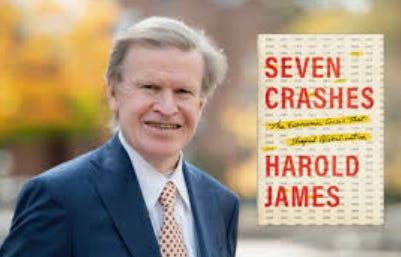Reviewing Harold James: "Seven Crashes: The Economic Crises that Shaped Globalization"
Crises have become the new normal, in the sense that present structures sre the result of past turmoil episodes. How should we make sense of the economic upheavals that have shaped our global...
Crises have become the new normal, in the sense that present structures sre the result of past turmoil episodes. How should we make sense of the economic upheavals that have shaped our global history? This is what Harold James, in his new book Seven Crashes, tries to do.
“A connected world is falling apart” is how Harold James begins his Seven Crashes: The Economic Crises that Shaped Globalization.
The industrial and agricultural depressions and revolutions of 1848, the crash of 1873, World War I, the post-WWI German hyperinflation, the Great Depression of the 1930s, the Great Inflation of the 1970s, the global financial crisis and Great Recession that started in 2008, and the COVID plague. These are his subjects: Economic shortages—especially of key food and energy resources. Famine. Disease. Social Unrest. Political upheaval. Geographic hotspots. These are the sources and expressions of Harold James’s crises. They, he believes, are “fundamental drivers that make humans more willing to reimagine how human ingenuity, and new techniques, may be used to solve problems and connect peoples across the world”. While such crises “at first sight look as if they are purely devastating, bringing death and destruction, [they] prove to be transformative”. The subject of the book is how such “transformation proceeds, and… revolutionizes thinking and reconfigures the story of globalization”.
But does his grand narrative hold up under scrutiny? Of course not. They never do. The book's true value, to me at least, lies in its rich tapestry of historical insights on how each individual crash and crisis.
There are three gems in this treasure I think especially worth noting:
How, while the 1840s crisis and the 1848 revolutions in Europe failed to bring a New Jerusalem, they did lead “governments… to reinvent themselves… [and] their relationship with commercial prosperity in a new way…. a wave of productive institutional adaptation…”
How, precisely, the post-WWI hyperinflation in Germany shook society off of its foundations as “I am upset by having to pay more [while] the innkeeper is angry because the money… no longer buys so many goods. We both think… we have lost out… manipulated by some sinister force… blaming… finance and money… foreign Polish and Jewish traders… [plus] foreign (western European and American) tourists… living… the high life…”
The story of the Great Depression and of John Maynard Keynes as a magician—trying to rescue global prosperity via institutions to balance out the radical financial-psychological instability of the modern global economy.
Keep reading with a 7-day free trial
Subscribe to Brad DeLong's Grasping Reality to keep reading this post and get 7 days of free access to the full post archives.





